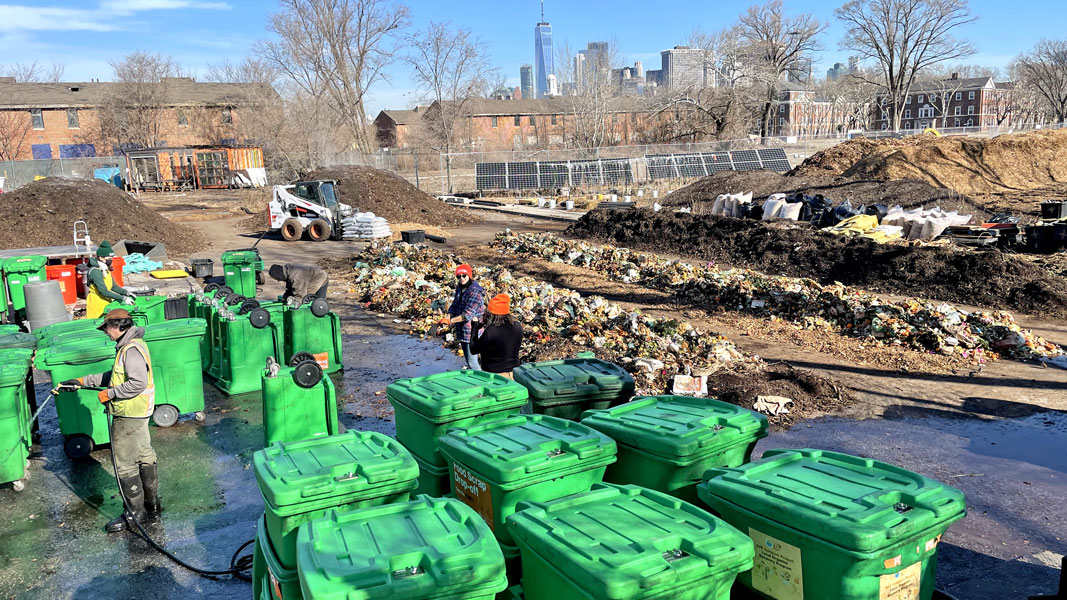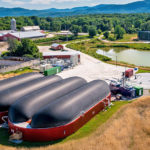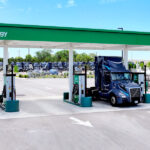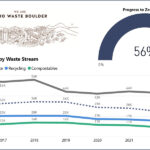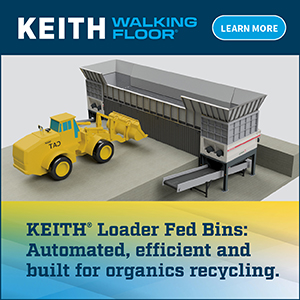Top: Overview of the Earth Matter NY food scraps composting facility on Governors Island in New York Harbor. Photo courtesy Earth Matter NY
Nora Goldstein
Thirty years after it was created by the New York City Department of Sanitation (DSNY), Mayor Eric Adams announced plans in November 2023 to cut $3 million in funding for the NYC Compost Project, essentially eliminating the program. DSNY created the NYC Compost Project in 1993 to “rebuild the City’s soils by providing New Yorkers with the knowledge, skills, and opportunities they need to make and use compost locally,” according to a 2013 BioCycle article, “Community Composting In New York City.” Adams’ budget also cut the funding for GrowNYC, a nonprofit, to operate its residential food scraps collection at 52 Greenmarkets throughout NYC’s five boroughs, which receive 25 tons/week of food scraps. The budget cuts became effective on January 1, 2024, and the mayor’s preliminary budget released in mid-January shows no funding for community composting through fiscal year 2028.
Local, decentralized food scraps collection and composting were pioneered in New York City and have served as an inspirational model around the country and the globe as a practical and effective approach to engaging residents to divert their food scraps from landfills and incinerators. “For decades, communities across the country have looked to New York City as the leading example of community composting in action, with citizens taking responsibility for, seeing the value in, and redirecting organics from the waste stream and returning nutrients to the soil as part of a long-term solution to climate change,” noted Marisa DeDominicis, Executive Director of Earth Matter NY on Governors Island, one of the NYC Compost Projects. “These local composting efforts are manifesting larger societal changes and benefit our parks and gardens.”
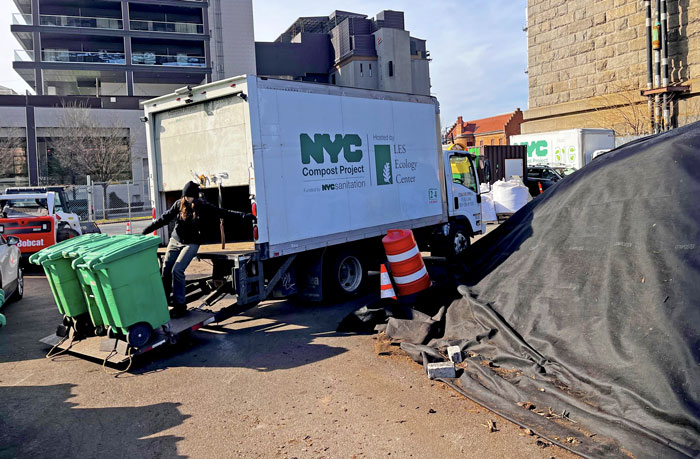
Lower East Side Ecology Center collects and transports food scraps to two community composting facilities, Big Reuse (above) and Earth Matter NY. Photo courtesy LES Ecology Center
One of the biggest thrills of my many years at BioCycle was touring the food scraps collection and composting infrastructure in Manhattan, the Bronx, Queens, Brooklyn and on Governors Island more than 10 years ago. Those tours anchored a 5-part series of articles written collaboratively with the NYC Compost Project and GrowNYC. We had the opportunity to talk to New Yorkers about why they participate in the collection programs at the Greenmarkets and community gardens, and work alongside volunteers participating in “windrow builds” with collected food scraps at several community composting sites.
A petition circulated by GrowNYC in November 2023 to restore funding to these programs summarized their benefits, which include supporting more than 115 green jobs: “Community composting organizations, including GrowNYC, Big Reuse, LES Ecology Center, Earth Matter NY, New York Botanical Garden, Queens Botanical Garden, Brooklyn Botanic Garden, and Snug Harbor Cultural Center & Botanical Garden collectively:
- Divert more than 8.3 million pounds of organic waste from landfills each year.
- Produce and distribute hundreds of thousands of pounds of compost to over 325 community groups, parks, 85 street tree care events, and thousands of individuals each year.
- Engage over 1,000 yearly participants in Master Composter activities through food, farming, and composting opportunities across the city.
- Provide compost outreach and education to over 600,000 New Yorkers annually, making them aware of food waste’s contributions to the climate crisis while providing the opportunity to address this critical issue.
- Operate six community composting sites — providing the most sustainable and equitable form of organics waste management.”
In early December 2023, GrowNYC received an anonymous donation that enables it to continue food scraps collection at Greenmarkets through the end of the fiscal year, June 30, 2024. Several weeks later, Mill, the company behind the home food recycling system (and also a proponent of local, decentralized food scraps management), along with other philanthropic partners, donated an additional $350,000 to maintain food scraps collection and transport and compost processing operations into the spring for the organizations previously funded by the NYC Compost Project. The funding prevented the loss of some of 40+ green jobs and expertise at risk as a result of these budget cuts.
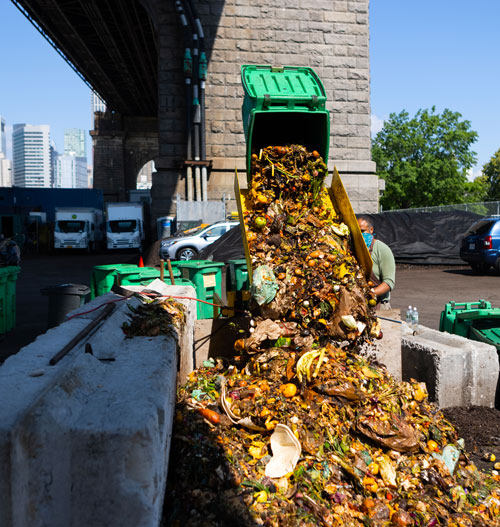
Food scraps being tipped into a receiving bunker at Big Reuse’s composting operation under the Queensboro Bridge in the Borough of Queens. Photo courtesy of BigReuse
BigReuse and Earth Matter NY are operating their composting sites with the donated funds. LES Ecology Center is currently just operating food scrap collections and delivering the food scraps to Big Reuse and Earth Matter NY. “Unfortunately, we are still without a compost site since we left East River Park in lower Manhattan in 2021,” explains Renee Crowley, Deputy Director of LES Ecology Center. “We were literally about to break ground on building out a site in Brooklyn in November 2023, but the Mayor’s budget cuts also removed the funding to proceed.”
Curbside Collection Prioritized
Part of Mayor Adam’s rationale for the cuts to community composting and collection of food scraps at Greenmarkets is the rollout of residential curbside food scraps collection. Essentially, DSNY restored a curbside program launched in 2016 under Mayor Bill DeBlasio. The current program began in the Borough of Queens and is scheduled to service households in all five boroughs by the end of 2024.
When Adams pulled DSNY’s funding for community composting, it eliminated one of the best tools for outreach and education and behavior change to foster household participation in the curbside program. In an interview with Kathryn Garcia, DSNY Sanitation Commissioner during the 2016 rollout of curbside food scraps collection, she acknowledged the symbiotic relationship: “Community composting provides a visualization of what DSNY is rolling out citywide with food scraps recycling. A lot of neighborhoods have community gardens that include composting. People get to see the transformation of food scraps to compost that is used in the garden. This really shows the circularity of the program.”
Food scraps collected curbside are processed into a slurry that is delivered to the anaerobic digesters at the Newtown Creek Wastewater Treatment Plant in Brooklyn. The majority of biosolids from NYC’s wastewater treatment plants, including Newtown Creek, are landfilled or used as daily cover at landfills; some is composted or land applied. None of the biosolids is recycled back to the soils in NYC.
This is in stark contrast to the compost made at NYC’s community composting and community gardens from food scraps collected from residents at Greenmarkets and other drop-off sites. It’s safe to say that close to 100% of that compost is used within the five boroughs of NYC to amend garden soils and landscapes, plant trees, nurture houseplants and more.
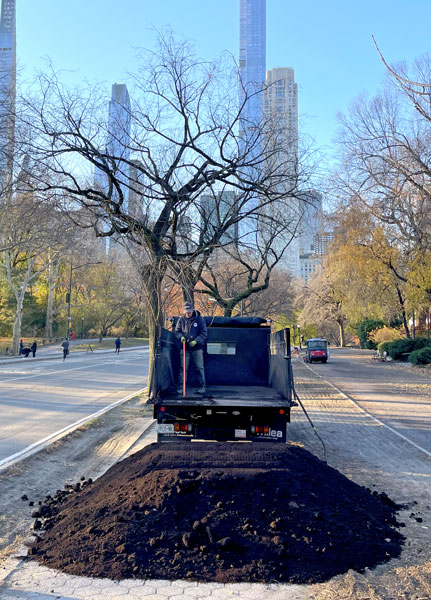
Compost made by a NYC Compost Project facility is in place to be used for landscape restoration and application to trees. Photo courtesy Earth Matter NY
While the stopgap funding provided by philanthropic donations has been critical, community composting in NYC is public infrastructure used by New Yorkers that must be publicly funded by DSNY. A statement issued in December by New York City Council Speaker Adrienne Adams, Council Member Sandy Nurse, Chair of the Committee on Sanitation and Solid Waste Management, and Council Member Justin Brannan, Chair of the Committee on Finance — in reference to the philanthropic funding — emphasized that “philanthropic support for community composting should supplement, not supplant funding from the City. Community based compost programs are vital to moving New York City closer to our sustainability goals and must be protected. The immense public outcry over the Mayor’s November Plan cutting funds for these programs is a testament to New Yorkers’ commitment to combating the effects of climate change. City government’s commitment must match that of New Yorkers, and the Administration must work with the Council and all stakeholders to protect community composting in the city’s coming budgets.”
BioCycle echoes these New York City Council members’ sentiments. DSNY’s funding for community composting infrastructure is literally a drop in the bucket of its total budget. It is a small investment that yields immeasurable benefits. There is still time for Mayor Adams to restore the funding. Otherwise, his decision, which is foolhardy and short-sighted, will show the true meaning of penny-wise and pound foolish.


